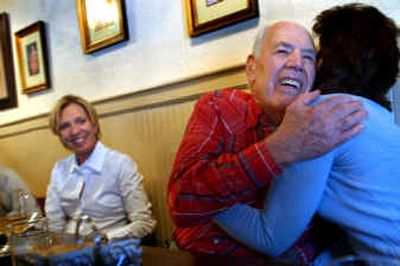Singing overwhelms his sorrow

The wife of Hollis Ladd carefully laid his clothes out for him each evening. She cooked all the meals, made the beds, cleaned their Cocolalla, Idaho, home. Even though she was ill the last years of her life, she was still the rock Hollis leaned upon in good times and in bad.
So when Helen died in February 2001, after 53 years of marriage, Hollis sank into sorrow so deep he contemplated suicide.
This column has a happy ending, don’t worry. I wouldn’t put a downer on you during this first post-daylight-saving-time week when darkness falls before 5 p.m. and seasonal affective disorders roam among us like creatures seeking revenge for all that summer sun.
Hollis’ decision to live rather than die provides a blueprint for others who feel surrounded by darkness, seasonally induced or otherwise.
And so back to those winter days of 2001 when Hollis, paralyzed with grief, somehow made it to the nursing home once a week to visit his older sister. He’d never sung before, but he sang to his sister in a rich, untrained baritone.
And with this simple gesture, he illustrated a blues-conquering strategy: When you’re in the pits, visit someone in a deeper pit. And while there, try singing.
One day he called his dearest friend, Mary Berryhill, a photographer and staff writer with the Bonner County Daily Bee. He asked her to listen to him sing. She said he sounded very good. With that encouragement, he next called Robin Marks in Spokane. He’d read a Spokesman-Review article about her “Sing from the Heart” class. Robin coaxes forth the hidden voices in adults who yearn to sing but feel too shy.
Once a week, for eight weeks, Hollis drove to class from Cocolalla to Spokane, stayed overnight with friend Tom Boyd, and drove back home again the next morning.
Hollis discovered another blues-busting strategy: Break out of your routine. Take a risk. Sing your broken heart out.
It was sometime in there that Hollis had this revelation: If you are lonely, you cannot sit home and stew. You must work the phones. And so he invited people to lunch. Many of them were middle-aged women, but it wasn’t a dating thing, because most of them were happily married.
He picked women who seemed filled with life, women who reminded him of his energetic and successful daughters who live in California and Phoenix. Women who possessed his wife Helen’s zest. Helen, as a younger woman, played semipro softball on a team sponsored by boxing champ Joe Louis.
In singing class, he met Leslie Laursen of Spokane, a 54-year-old woman so kind that upon first meeting her, you feel like sharing your deepest secrets. Hollis asked Leslie to lunch. She said yes.
“Every time I talk to him, he says, ‘I am so blessed,’ but he is the blessing,” Leslie said.
Back home in Idaho, meanwhile, Hollis had always enjoyed talking to Shawn Reist, who works for the power company. He’d pay his bill in person and chat. One day, Shawn was moved behind the scenes in a new job. Hollis tracked her down and asked her to lunch. She said yes.
And he also met Betty Endress, 69, who worked at the Sandpoint Senior Center. Betty, an accomplished pianist, asked Hollis to perform with her at The Bridge, an assisted living community in Sandpoint. Hollis said yes.
Last Tuesday, I met up with the weekly “Ladd and Lady Luncheon Club” at Connie’s, a restaurant in downtown Sandpoint. Hollis had just celebrated his 85th birthday the day before. The retired career Navy man, who after the Navy worked as a hospital department manager, sat with Mary and Leslie and Robin and Shawn and Betty and apologized because not all of Ladd’s Ladies could make it that day.
Robin said of the lunches: “All of the sudden, you are in Hollis Land. You forget your problems. You are in another world.”
Betty said: “He’s a good example to all of us. You can feel sorry for yourself or take the world by a string and go for it.”
After lunch, we all drove to The Bridge. For one hour, Hollis sang songs of his era, all by heart. Betty played the piano. This is his usual Tuesday routine, too. Most of The Bridge residents are women, but one man there was so moved with emotion that he made a fist and pushed it up against his mouth as if to keep inside tears that poured forth anyway.
The afternoon at The Bridge was filled with a lovely melancholy. And this is what I like best about Hollis’ blues-busting regimen. It does not ignore the grief still inside him. He lunches with the younger women, but he sings to – and with – the older ones. His wife, Helen, is dead – and nobody will replace her. There is much to be sad about, period.
But still, Hollis sings. He chose life instead of death when Helen died. Then, as a bonus, he found his unique voice. You can hear it clearly now, even in these early darkening days, because there’s always light in Hollis Land.